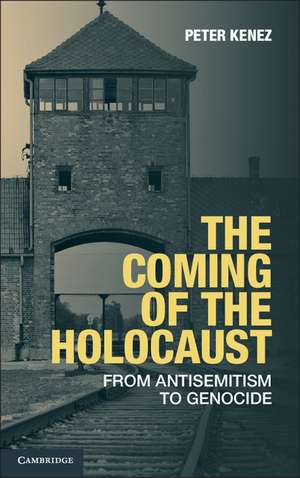The Coming of the Holocaust: From Antisemitism to Genocide
Autor Peter Kenezen Limba Engleză Hardback – 29 sep 2013
Preț: 561.92 lei
Preț vechi: 631.37 lei
-11% Nou
Puncte Express: 843
Preț estimativ în valută:
107.54€ • 112.13$ • 89.37£
107.54€ • 112.13$ • 89.37£
Carte tipărită la comandă
Livrare economică 20 martie-03 aprilie
Preluare comenzi: 021 569.72.76
Specificații
ISBN-13: 9781107043350
ISBN-10: 1107043352
Pagini: 316
Dimensiuni: 152 x 229 x 22 mm
Greutate: 0.57 kg
Ediția:New.
Editura: Cambridge University Press
Colecția Cambridge University Press
Locul publicării:New York, United States
ISBN-10: 1107043352
Pagini: 316
Dimensiuni: 152 x 229 x 22 mm
Greutate: 0.57 kg
Ediția:New.
Editura: Cambridge University Press
Colecția Cambridge University Press
Locul publicării:New York, United States
Cuprins
Introduction; Part I. Rise of Modern Anti-Semitism: 1. French Jews; 2. Jews of the Russian empire and of the Soviet Union; 3. Hungarian Jews; Part II. The National Socialists Take Control of the German State Machinery: 4. National socialism and Jews; 5. Propaganda; 6. What to do with the Jews?; Part III. War: 7. Ghettos in Poland, 1939–41; 8. The Holocaust in the Soviet Union; 9. The Romanian Holocaust; 10. Germany, 1942; 11. The Holocaust in Western Europe; 12. The last island: Hungary; 13. Extermination camps; 14. Afterthoughts.
Recenzii
'The distinguished UC Santa Cruz historian Peter Kenez has taken on the daunting and complex task of explaining the origins of the 'Final Solution'. He does so with deep erudition, perfect moral balance, patient reasoning, and crystal-clear prose. The Coming of the Holocaust will surely become the standard introduction to this painful and important subject.' Norman M. Naimark, Stanford University
'An extraordinarily insightful and prolific author, Peter Kenez has again produced an important oeuvre, which combines the modern history of Jewish emancipation, antisemitic reaction, and the tragic story of the Holocaust. Although written by a survivor, the style is judicious, scholarly, and, at the same time, highly readable. Kenez clearly proves that the Holocaust was the consequence of the nineteenth-century emancipation of European Jews and of their incredible successes in nearly every aspect of human endeavor. Fear, resentment, and greed motivated the Russian pogromists as well as the Nazis and the East European extreme nationalists. Fortunately, there were also many helpers of the Jews and so, at last, the antisemites triumphed only partially.' István Deák, Columbia University
'This remarkably concise volume covers much territory with lucid prose. Its overall tone is straightforward and calm, a composure that is especially impressive given the passionate differences of opinion about the Holocaust. Among the book's more prominent traits is its focus on the unintended consequences and terrible ironies of decisions made - by all in involved - in these appalling years: victims, victimizers, bystanders, and those who don't really fit into any neat category.' Albert Lindemann, University of California, Santa Barbara
'This work by a veteran historian is a helpful addition to the field of Holocaust studies.' The Russian Review
'An extraordinarily insightful and prolific author, Peter Kenez has again produced an important oeuvre, which combines the modern history of Jewish emancipation, antisemitic reaction, and the tragic story of the Holocaust. Although written by a survivor, the style is judicious, scholarly, and, at the same time, highly readable. Kenez clearly proves that the Holocaust was the consequence of the nineteenth-century emancipation of European Jews and of their incredible successes in nearly every aspect of human endeavor. Fear, resentment, and greed motivated the Russian pogromists as well as the Nazis and the East European extreme nationalists. Fortunately, there were also many helpers of the Jews and so, at last, the antisemites triumphed only partially.' István Deák, Columbia University
'This remarkably concise volume covers much territory with lucid prose. Its overall tone is straightforward and calm, a composure that is especially impressive given the passionate differences of opinion about the Holocaust. Among the book's more prominent traits is its focus on the unintended consequences and terrible ironies of decisions made - by all in involved - in these appalling years: victims, victimizers, bystanders, and those who don't really fit into any neat category.' Albert Lindemann, University of California, Santa Barbara
'This work by a veteran historian is a helpful addition to the field of Holocaust studies.' The Russian Review
Notă biografică
Descriere
The Coming of the Holocaust aims to help readers understand the circumstances that made the Holocaust possible.
